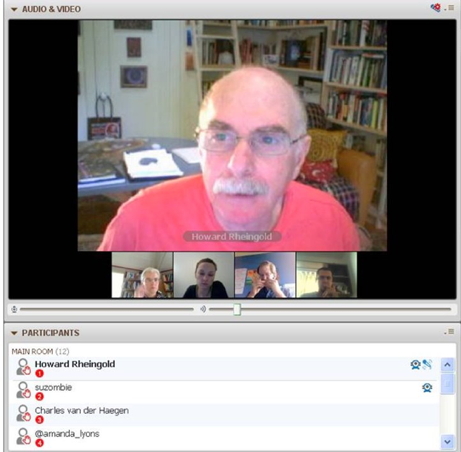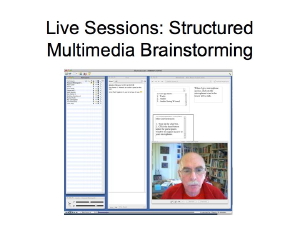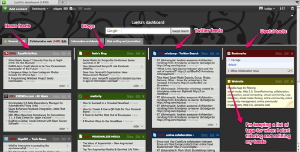Curation Skills: The Keys to Personal and Social Knowledge Navigation

An immersive learning experience from Rheingold U
A half-day (four hour) online workshop with Howard Rheingold introduces the mindset, methodology, and tools necessary to establish oneself as an authoritative curator of specific niche topics, to grow a following and reputation as a curator, and to connect with communities and networks of other curators. Learn about tools to bring continuous streams of relevant information to your attention and techniques for harvesting useful knowledge.
Today's Problem/Opportunity: Cultivating Selectivity in an Age of Information Overabundance
In today's knowledge-driven economy, a key emerging skill involves developing one's own informational niches -- the places that an individual can stake out and establish his or herself as an authority. Traditionally this process has been dictated and guided by the rigorous structure of formal academic institutions.
The Solution: Curation Training
In the modern, knowledge-driven economy, one of the critical new skills is developing one's own subject matter domain -- the place that one stakes out and establishes as his or her expertise domain. Traditionally this was the exclusive purview of the academic within a formal university context. But todayıs world is moving too fast for the academic community to keep up; and the requirements for credentials in these emergent fields has become subsidiary to the ability to build around oneıs self a network of co-creators and collaborators, and a following of consumers of the expert's guidance and advice
Rheingold U's curation curriculum provides the means to deliberately take control of a subject area, to own it, to extend it, to establish an authoritative position, and to generate the network of co-generators and follower/consumers. The course distinguishes a set of readily-applicable cognitive skills for developing subject matter expertise in any discipline, and then enables the ongoing development of referential and intellectual relationships to maintain and grow the participant's expertise and position in the selected subject matter domain.
The development of these skills is reinforced through a series of exercises using the most applicable tools currently available for accomplishing these tasks. The course is designed with recognition that tools and functionality may come and go, and demand for an array of skills and understanding is necessary for managing intellectual capital over time. By instilling strategic knowledge, understanding, and insight, the workshop offers a unique opportunity to add new skills that will last for a lifetime.
Curation is a required fundamental competency necessitated by new information generation and distribution mechanisms that have arisen over the past two decades. Dealing effectively with the sheer quantity of new information being generated is but one dimension that needs to be considered; the source of this information, its taxonomic structuring, its semantic applicability, and its social context all must be considered as part of the overall context for understanding. This is further compounded by the exponential increase in personalization of distribution channels -- the capacity to annotate, bookmark, and establish further context around both discrete information artifacts and around information flows represents additional demands on the curator. Until now, the ability of most information-inundated workers to meet this challenge has been driven by the available tools used to process information flows such as RSS readers and bookmark sharing services. However, the adoption of these tools by most users, without a guiding strategic and conceptual framework has resulted in disconnected, non-integrated buckets of unwieldy meta-data that defies practical use as the size of individuals' collections increase. Rheingold U's curation approach provides a strategic and comprehensive guiding framework and methodology that enables integration, refinement, efficiency and utility to the newly oriented curator.
After the course, specific skills and information management tools will be organized within a context of achieving and maintaining real expertise in the participant's chosen subject area, whether academic, technological, engineering, professional, sales, marketing, resource, finance, or other disciplines. Participants report a new and enduring confidence in establishing and maintaining intellectual niches and repositories, and an enhanced and sustainable boost in their capacity to perform. In addition, the course creates for each participant connections and ties to like-minded experts, independent scholars, and public intellectuals who are similarly engaged in developing this new growth tip of competencies for effective and productive information citizenship in the 21st Century.
What You'll Learn
Curation focuses on these specific competencies/areas of focus:
- What is Curation? Exploring the relevance of this topic in today's info-sphere.
- The Curation Process. Establishing a niche, discovering and qualifying sources, selecting and verifying stories, tagging, and contextualization.
- Curation Mechanics. Bundle, Organize, Share and Syndicate, Socialize and Engage
- Feed Management. Managing syndicated information feeds from information providers, blogs, and other dynamic sources.
- Building Dashboards. Consolidating, organizing, and developing the means to oversee a broad spectrum of topics and interests effectively.
- Social Bookmarking. Determining reliable and reputable information sources and tapping into their flow. Also, establishing one's own reputation and validity as a provider.
- Distribution and Dissemination. Becoming a provider/publisher: using tools to automate access to and output from the artifacts generated from developing and maintaining oneĠs own niche.
- Mastering Curation Tools: How and why to use Delicious, Diigo, Storify, Paper.li, Scoop.it, and Pearltrees.
Each competence is developed using exercises that are directly and immediately applicable to the participantıs work/body of interests. A learning community structure enables participants to co-learn as a community and test new ideas and concepts, as well as to acquire novel approaches and share best practices with each other. At the end of the course, each participant will have both a new set of approaches for using the tools currently available to achieve the desired outcomes as well as an orientation toward the future for lifelong application of these new informational competencies.
The Workshop: How it Works
During the first part of a live session, instructor Howard Rheingold explains the philosophy and methodology of curation -- a means of training your attention to make the best use of your time and online resources -- and uses audio, video, slides, whiteboard, and text-chat to demonstrate how to create and use information dashboards, radars, and filters. During the second and third hours, Howard remains available online to answer questions while learners create their own infotention toolkits. During the final hour, learners upload screenshots and discuss their tools and methodologies. Following the live session, learners will have access to a continually updated compendium of resources and an asynchronous discussion board for asking questions, seeking technical support,and discussing their learning. Every how-to demonstrated during live sessions is documented in step-by-step slideshows available to learners, in addition to a continuously updated compendium of resources regarding curation methods and tools.
About the Instructor
Howard Rheingold has been lecturer at University of California, Berkeley School of Information and Stanford University's Department of Communication since 2004. He is credited with coining the term "virtual community" in 1987. His 1993 book about what are now called social media, "The Virtual Community," was one of Business Week's ten best business books of 1993, and Business Week named him one of its "visionaries" of 2003. Time magazine named Rheingold's Electric Minds one of the ten best websites of 1996. The New York Times named "Smart Mobs" as one of the best ideas of 2002. He was one of the winners of HASTAC/MacArthur Foundation's Digital Media and Learning Awards in 2008, awarded Doctor of Technology degree by De Montfort University in 2009, and invited to deliver the Regents' Lecture at UC Berkeley in 2012. Endorsements by former students of Rheingold U. online courses can be found at Rheingold U.'s endorsements page. If interested, contact instructor via howard@rheingold.com
Cost for the live webinar, access to online how-to support materials and asynchronous support forum is $350, discounted to $300 for purchases of 10 seats or more. Each course cohort is limited to 10 learners.
Benefits for the learner
- Hone the ability to find subject matter experts and locate high quality information on the specific topics you need to know.
- Tune information radars that continuously scan and provide information on specified topics as soon as it is published.
- Develop skills and techniques for selecting and contextualizing high quality information in your niche.
- Gain the ability to quickly create radars, scan dashboards, pinpoint key information, begin refining raw data into actionable knowledge by selecting, tagging, contextualizing, and sharing continuous streams of information about precisely targetted fields..
Benefits for the Learner's Employer
- Employees waste less time, get more done online.
- Employees gain faster access to better information about subjects that affect your enterprise's bottom line.
- Employees gain information-handling skills and learning methods that make collaborations more productive.
- Employees stay up to date on tools and data relevant to their fields.
- Employees establish reputations as subject matter experts.

